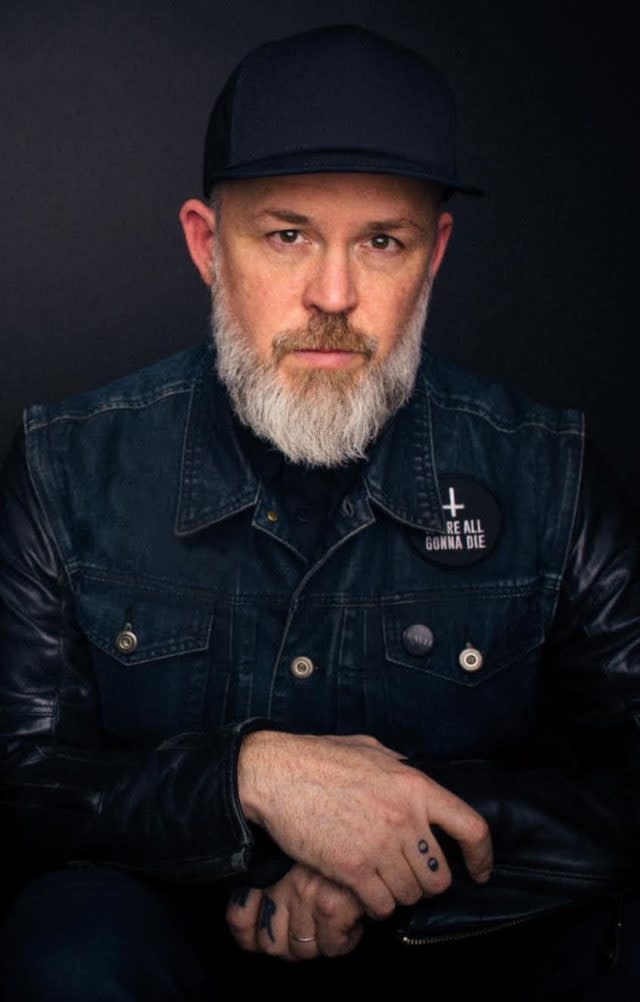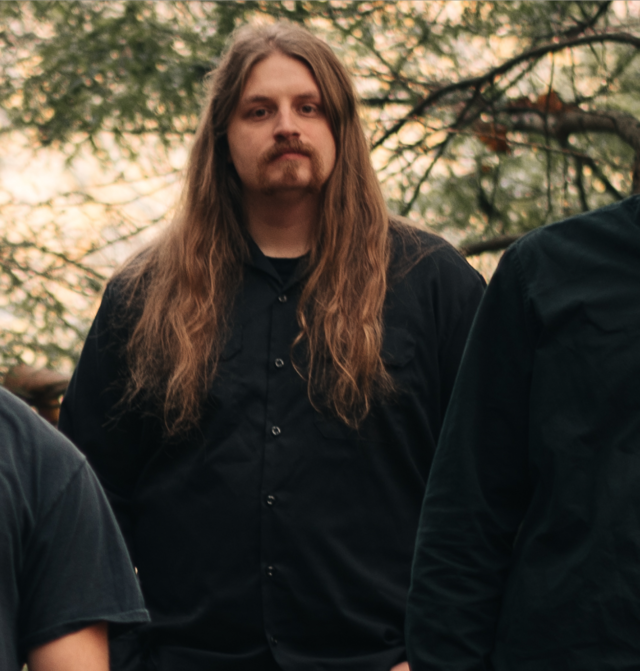Mer de Noms at 20: Musicians Celebrate A Perfect Circle’s Debut
At first, Tool fans were kinda bummed. Word of a Maynard James Keenan side project — while appealing on paper — was met with apprehension and dismay, as it threatened to further delay the studio sessions for the follow-up to Ænima, which they’d already been impatiently waiting years for. When the album finally hit record store shelves on May 23, 2000, those fans weren’t skeptical anymore.
As they’d learn fast, A Perfect Circle was no Tool clone. The music was largely written before Keenan ever became involved. Guitarist Billy Howerdel, the creative strength behind the avant-rock outfit, was a former guitar technician who’d worked for Nine Inch Nails and Faith No More. He became friends with Keenan in 1992 after meeting on tour; Tool were opening for Fishbone, who Howerdel was working for. The two later lived together for a while, and after Howerdel initially considered a female vocalist, Keenan offered to help bring Howerdel’s tunes to life.
A Perfect Circle — rounded out by former Failure guitarist Troy Van Leeuwen and bassist and violinist Paz Lenchantin — released its first album, Mer de Noms, 20 years ago this Saturday. Boasting a dozen atmospheric tracks, including rock radio staple “Judith,” A Perfect Circle’s debut offering proved wildly successful, debuting at No. 4 on the Billboard Top 200 — making it the highest-charting debut from a rock band, ever.
While Tool comparisons were inevitable (and obvious) — if only because of the alternately soothing and volatile Keenan — listeners discovered that A Perfect Circle was a different beast. The songs were sparse and more concise, with intense, soaring guitars enveloped by blistering bass lines and eloquent, effective drum work. The record is as potent today as it was when two decades ago. To commemorate the 20th anniversary of A Perfect Circle’s inaugural release, SPIN reached out to a number of musicians for their thoughts on why this groundbreaking opus still resonates with music lovers all these years later. The following reflections are in their own words.
Spencer Chamberlain
Singer, Underøath

Credit: Logan Tilley
I was in local bands in high school when that came out. So, when I think about it, I guess it was a long time ago, but the reason why it doesn’t feel 20-years-old is that I still listen to it. That record is iconic, to me. I’m the youngest; I have an older brother and two older stepbrothers. The oldest stepbrother was a little too old, so we didn’t hang out, but the other one, he had a huge influence on me musically. My brother and all of his friends, they had a huge influence on me musically. I was into what my brother and his friends were listening to. That’s how I got introduced to all this cool shit at a young age.
My parents turned me on to Led Zeppelin, Pink Floyd, Rolling Stones, the Beatles, and if we were going to play instruments, we had to learn all that stuff. And that was a blessing, and then we got into our Nirvana-Alice in Chains stage on our own, and then I remember Tool, which obviously led me to A Perfect Circle. It was like, if you were a Tool fan, that was the intro. I was a huge Tool fan because my brother listened to it religiously, and so I heard it all the time.
I remember picking it up at School Kids Records. It had a slickness to it and the melodies … A Perfect Circle was almost more up my alley because I like that more melodic side of the hard rock stuff. I always thought it was sexier because it had this vibe that was like… the tempo, and the melody choices. It painted a better picture in my mind a lot of times than just the way more aggressive hard rock stuff. So, when that record came out, it was like, “Dude, this is everything.” I think the end of “3 Libras,” it’s been in my head for like 10 years. I don’t think that has ever left my head. If I hear any note from that chord progression, it’s in my head another year.
The album is iconic and still relevant, which is sick. I remember playing it for a friend in high school and him not getting it. I remember just getting so frustrated. Like, ‘How do you not feel that?’ I wanted to share that record with people and couldn’t stand when they didn’t get it.
Riley McShane
Singer, Allegaeon

Credit: Stephanie Cabral
To me, Mer de Noms represents a time in my life when I first discovered that music can have a variable kaleidoscope of different dimensions of emotional expression. Up until I heard A Perfect Circle, I only sought out aggressive, angry music to compliment the teenage angst I was completely muddled with. When I first heard “Judith,” it totally scratched that itch for me, and, as a fan of Maynard’s work in Tool, I went out to buy a copy of the album almost immediately.
For days, I would pop the CD into the big boombox on top of my dresser and just listen to “Judith” on repeat until one day, I must have forgotten to hit that “Repeat One” button and “Orestes” started playing. I was shook — I couldn’t believe that a band that was so aggressive could so seamlessly move from distorted guitars and long, held-out screams to the morose and almost docile sound expressed in “Orestes.” At that point, I just decided to let the album play and when “3 Libras” came to bat as the very next song, I realized that music had so much capability to capture so many different emotions — emotions that I was feeling in so many different ways as a 13-year-old boy. It gave me something to turn to when things weren’t as black-and-white as being angry and being happy.
From there, I obviously continued to expand my musical horizons, finding music much “heavier” than Mer de Noms, but that album will always stand as a monument in my musical journey to what it means to be a truly varied and emotionally attuned set of artists, unafraid to run the gamut of human experience in a piece of truly legendary art.
Ash Pearson
Drummer, Revocation

Credit: Alex Morgan
I first would have heard Mer de Noms in 2001 when I was 13. My earliest impressions of the album were centered around the general quality of the production. It was during my early days as a musician, so I was still sharpening my ear to the nuances of sound, mixing, and other aspects that make a record sound different [or better] from another. All of the instruments were so well balanced and clear. Being a drummer, I especially loved the use of natural drum tones, bright cymbals, and Josh Freese’s articulate, world-class playing style. One could tell the band simply captured a good studio performance and didn’t edit it into stagnation.
It was also the first time I had ever heard Josh Freese on drums. I loved the restraint of his playing on this record. He was clearly a badass but always played what was right for the music: playing “straight-ahead” yet with complex, tasteful embellishments. This unhinged but highly methodical approach had a major influence on my drumming. It’s no wonder that even 20 years later, I can still remember almost every fill and kick pattern on the record. I also can’t believe it has been 20 years. Where the hell did the time go?
Bill Calomiris
Singer, Gloom

Credit: Iron Elephant Studios/Chris Joao
A Perfect Circle and Mer de Noms are turning 20 and I’m officially old. I was a senior in high school the year it came out. The Y2K scare was only a few months old, JNCO jeans were alive and well, and 9/11 wouldn’t happen for another 16 months. Then came A Perfect Circle: an interesting amalgamation of late ‘90s rock and metal sensibilities with a decidedly progressive attitude. They’re neither rock nor metal but have been able to comfortably walk that musical line and carve out a niche for themselves in both audiences as a result.
It is near impossible to find into someone in the metal community who’s never heard of them. Mer de Noms was the album that hollowed out that niche in the music industry. Unsurprisingly, Maynard’s lyrics on this album are timeless, brutally honest, and his hook melodies throughout the album are never boring or recycled despite being so uniquely identifiable as his. It almost seems that in A Perfect Circle, Maynard was able to grow into other areas as a vocalist that he wouldn’t have been able to just play in Tool.
The songs have a bleak-yet-hopeful, nostalgic, melancholic sound that meanders and undulates throughout the album. This cohesiveness is a large part of what gives the album it’s sonic character. What also defines A Perfect Circle for me is the pace of the songs which they haven’t deviated much from in the past two decades. The hooks are done so tastefully that nothing feels contrived or dated to any decade or trend, making it a more impactful and seminal album. So many aspects of Mer de Noms are unique that calling it anything but a classic almost feels like an insult.
Sean Bilovecky
Guitarist, Frayle

Credit: S. Bilovecky
It’s hard to believe Mer de Noms is 20. For me, Tool was definitely the gateway drug that led me to A Perfect Circle. I don’t know if it’s a timeless record. But “3 Libras,” “Judith” … there’s a couple of songs on there where the sound and the texture is absolutely timeless. You put Maynard’s voice with Billy’s guitar stuff, where he’s kind of playing octaves or leads over or next to the vocal … to me, that sound is timeless. Nobody else has that sonic texture and that stamp is unique to me.
For me, “3 Libras,” the lyrics to that were just, and still are, really powerful: Threw you the obvious to see what occurs behind the eyes of a fallen angel. Like, that’s amazing to me. And the video for “Judith,” that looked amazing; it had kind of a live feel, and they’re in a rehearsal space with cables all over the place. And the bass player, Paz Lenchantin, she does this move where, in between a part, she really quickly ties her hair up, and then her hands come back down just in time for the part to start again. Just from being on stage, that felt so familiar, like when you drop a pick, or you have to tune your guitar really quick, or you’re grabbing a beer, and you come in right in time. But having a woman do that with her hair, which is kind of sexy and feminine, but still playing bass like that … that was a magical moment in the video for me.
Adam Biggs
Bassist, Rivers of Nihil

Credit: Logan Tilley
I never really understood Tool. I know, it’s considered a deep sin in the realm of progressive music to shun them in any capacity, and I don’t dislike them or anything. Their music just always felt like a bit of a slog to me, even as someone who can sit through just about any classic prog-rock opus you can throw at them. I always really appreciated their effort to keep the genre alive and inventive especially in a time when that definitely wasn’t considered “cool.” The main thing that always bothered me about this, however, was that I absolutely loved Maynard James Keenan’s powerful vocal ability and delivery, there was just something about it that felt to me as though it wasn’t being used to its fullest potential.
Enter A Perfect Circle, and their breakout debut, 2000’s Mer de Noms. It seemed to show a new side of Maynard and a whole new context for his voice to shine upon. At the time, the “supergroup” nature of the band was sort of lost on me aside from Keenan himself — I was 13. All I knew was that I was hearing that intriguing voice I’d heard in all of those creepy, cool music videos from my childhood but with a sort of renewed vigor, and a new, more hook-oriented focus. It took until their second record for me to understand exactly who Billy Howerdel was and how understated and striking his contributions to my overall musical appreciation really were.
That being said, Mer de Noms’ contribution to genuine rock music in the early 2000s can never be undersold. “The Hollow” crushes with its fiery hunger, “Judith” lashes out with vitriol toward a manipulative dogma, and “3 Libras” lulls you in with melancholy and beautifully vibrant orchestration. All of this while keeping an incredibly refined focus on songcraft and that oh-so-coveted replayability factor. I have trouble not belting out these songs along with Maynard every time I hear them.
It’s hard for me to put a finger on exactly how much this record impacted my young and malleable musical mind. But its effect on me was certainly palpable, and unlike a lot of records I listened to at age 13, it holds up rock-solid to this very day.
Erik Leonhard
Guitarist, KOSM

Credit: Derek Car
I became an A Perfect Circle fan when I was about 14. I had just joined a band with a couple of guys who wouldn’t stop raving about this Maynard James Keenan guy. At the time, I hadn’t heard of either A Perfect Circle or Tool, so it didn’t mean a lot to me. It wasn’t until they finally forced me to listen to Thirteenth Step that I finally became a convert to that whole 2000s-era world of melodic alt-metal. When I finally finished geeking out over Thirteenth Step and checked out Mer de Noms, it was like I had discovered a whole different version of the band I already loved. I was blown away by how different a band could sound album-to-album.
Mer de Noms is immediately palatable for the listener, but also musically complex enough to keep the listener’s attention well after the first few listens. It did a great job of distilling the melodic but heavy sound that really defined that era of rock and metal, so it’s not surprising that it was popular at the time. But I think a lot of bands of that period in rock didn’t end up having a lot of staying power, mostly because so much of that style of rock is so sugary and straight forward. By contrast, with Mer de Noms, A Perfect Circle took that general style of music and put so much depth and thoughtfulness into it. It’s both pleasing and challenging.
I was totally blown away by how A Perfect Circle were able to layer their instruments. They have always been great at taking minimalist instrumental parts (parts that often don’t sound like much on their own) and putting them together to form these really musically complex songs. This is something I’ve really admired for a long time. As a guitarist who tends to write really busy parts, I sometimes have to remind myself that it’s possible to build a really big sound out of small parts.
I really got into this album when I was basically still learning to play guitar, and I naturally thought that every song had to be 100-percent about guitar all the time. “Orestes” really helped to expand my understanding of rock and metal music. Even though I think that A Perfect Circle are basically a guitar-centered band, the emotional power of a song like “Orestes” really comes from the whole band, shaping the sound in unison. It really helped me understand that it’s just as important to focus on what everybody else is playing as it is to focus on your own parts.
Keeno
Guitarist, Dischordia

Credit: Michael Castillo
I was 15, and shoulder deep in my musical exploration when I first experienced A Perfect Circle. I’d been a Tool fan for about four years by then, so I was excited when my buddy Brad picked up Mer de Noms on his way to see Nine Inch Nails in Dallas (I was also super jealous). I knew from my first listen, this album was special. Its dark, gritty nature blended flawlessly with a surprisingly melodic beauty that pushed and pulled the listener with a disarming elegance.
It’s incredibly well-balanced. The drums were mixed upfront, but still finessed an emotional and technical foundation that lulled the listener into a hypnotic trance with just enough twists and turns to keep them on their toes. The thick, heavy bass and rhythm guitars seamlessly rode the line between hard rock and heavy metal. For me, the highlight of the album was Billy Howerdel’s guitar work. His leads and melodies were rich and thoughtful without being too wanky or gaudy. I recall really wanting a guitar slide after I first heard “Judith.’ The music on Mer de Noms was a refreshing counterpart to Maynard’s unique and noteworthy vocal stylings, generating an almost gloomy optimism in its sound, and creating one of the most complete and compelling records of the 2000s.
Daniel Jesse Pruitt
Guitarist/Vocalist, Lord Buffalo

Credit: Matt Shaw
Mer de Noms came out the month I graduated from high school. I’d grown up on rock radio, but by 2000, I was already feeling the suck of deregulation on radio and looking elsewhere for music. Mer de Noms came just as I began to give up on the rock that was coming out and was diving into less radio-friendly varieties of psych and folk.
I don’t know if I realized it at the time, but part of what made this different from other more format-friendly contemporaries, and what continues to be interesting about Mer de Noms is the band’s ability on certain songs to blend its influences into something new and different. There are moments when the juxtaposition of seemingly disparate musical elements comes through as a distinct voice. On the surface, the record leans towards a heavy feel, however, the record contains some exploration of elements that are not traditionally heavy. Paz’s violin on “3 Libras,” the cumbia-like drum beat towards the end of “Renholdër,” or the acoustic guitar work on songs like “Rose” aren’t ingredients you expect a band like this to be cooking with. At the same time, they blend in monotonous, hammering—almost Swans-like—repetition in the back half of “Thinking of You” and relentlessly somber bass on “Magdalena.”
When all these elements combine with less regard for hard rock conventionality, it works. The idea that the darkest guitar part might be a groaning acoustic guitar and not a Les Paul into a Marshal, or that you can put a bombastic rock freak-out next to a delicate violin arrangement with proggy verse arrangements — think “Rose” next to “Judith”— seemed freeing to me at the time. Don’t get me wrong, there is plenty of middle-of-the-road rock guitar and shouting on this album, but I think Mer de Noms is strongest when it wanders away from straight-ahead rock.
To that effect, there is a closeness to Keenan’s vocals on this record and his approach is more intimate than the instrumentation would lead you to expect. The music is often heavily dynamic, but there is a human element added by a more vulnerable vocal sound. This record was an education for me. I realized screaming wasn’t the only way to be intense, that sometimes the heaviest thing you can do is bring it in close.

